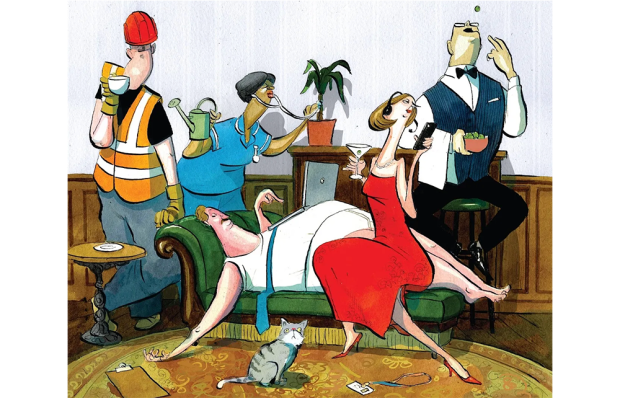One of the genuine pleasures I always take in arriving back in the north-east after being in London is that I am suddenly transformed from being an aged fat pig with bad teeth into a youthful, lissome creature with teeth no different to anybody else. It is not the clean air or the glorious countryside which has this effect; it’s just that everything is comparative.
Giles Coren once observed that for every 50 miles you travel away from our capital, you go back in time about ten years. If this is true — and I suspect it is — then up here on Teesside we’re in the middle of that very agreeable summer of 1970, with hot pants, Ted Heath suddenly elected, Rivellino scoring goals for fun in the World Cup and The High Chaparral on the telly. Suits me just fine — indeed, it’s close to idyllic. But I think also that for every 50 miles you travel north from London, the weight of an average individual increases by one stone — and that by the time you reach Dundee you have entered the land of the unimaginably, fantastically vast; the land of Mr and Mrs Jimmy McBrobdingnag.
The government is getting nannyish about obesity once again, given that we are as a nation stricken with it, an epidemic far more dangerous than anything Covid has to offer. The problem is, I think, that the government is getting nannyish in the wrong way. We have had 20 years of governments trying to impress upon us the need to lose weight, but the graphs show that, whatever measures are introduced, our waistbands continue to expand by the year.
This is because — at the behest of the well-meaning but stupid charities and the woke health professionals — each government has bought into the three obesity canards of the liberal left. The first and silliest is that big business is to blame. Too much sugar in food, too many ready meals, too much fast food. But the sugar and fat levels of processed food have reduced since the 1970s — a decade when obesity was not a problem.
The second canard is that poverty is to blame. In the simplistic world of the left the correlation is straightforward. Because the highest levels of obesity occur in areas with the highest levels of something called ‘deprivation’ (an interesting paradox, if you think about it), lack of money must therefore be the chief cause of people eating too much crap. It is a false correlation. Processed food is not terribly cheap and nor is fast food, except for the excellent-value 99p McDonald’s cheeseburger. But there may be a correlation, albeit one difficult for politicians to make, between being ‘deprived’ (i.e. having not much money) and not always being accustomed to making the right choices in life, which is at least one reason why they are ‘deprived’. This of course is what the left and the charities would call ‘victim-shaming’, but to describe a phenomenon is not to alter it.
The third canard is the most counter-productive of all: that obesity is a ‘condition’ imposed upon individuals, against their will. Imposed by what, or by whom, exactly? This takes away from the individual the right to control his own destiny by not eating as much and maybe taking a bit of exercise. Instead, lardbuckets can assure themselves that their gargantuan weight is none of their fault whatsoever and that they require some sort of treatment for it at our expense, such as having their guts stapled up. This is infantilising and of course makes the problem worse. So too does the concomitant injunction not to ‘fat shame’ people, nor to stigmatise them. It may be unkind to stigmatise the overweight, but stigma has its uses: it is the method by which society convinces errant members that their behaviour is unconducive to the whole. It was after an argument six years ago, when my son called me a ‘fat lardy twat’, that I felt enjoined to lose four stone in a year — I hope I can convince him to be similarly cruel again, as much of that weight has gone back on. Allied to this is the conviction that it is a good thing for fashion companies to display their clothes on models who are morbidly obese, because this challenges stereotypes about body shape etc. What it actually challenges is common sense and the desire to be healthy.
There are many more reasons for our obesity epidemic. We are much more affluent than we were even 30 years ago, and one of the principal avenues for displaying this wealth is by stuffing our fat faces until they get even fatter. Obesity is largely a problem in the richest societies. We are also far more sedentary — especially the kids. We do far less manual labour and money buys us the freedom from even such gentle exertions as DIY. The children, meanwhile, are addicted to their phones and tablets and in any case are much less likely to spend time enjoying themselves outside because — again paradoxically — we worry about their safety. The decline of competitive sport in schools (and the selling-off of playing fields) must surely have contributed to the growing stomachs of young people. As an early teen I spent every single day of the holidays playing football. Does that still happen anywhere except in poor countries? Affluence, again, is a problem. Affluence and convenience, the two being closely linked.
And then there’s this. I accept that some people are ‘time poor’ and resort to ready meals because there’s no time to prepare something from fresh ingredients. This is an unforeseen consequence of the great march of women into the workplace, from 1972 onwards. Now both parents are out at work all day. But try advancing that argument and see how quickly you’re kicked off Twitter or Facebook, or sacked.
Got something to add? Join the discussion and comment below.
Get 10 issues for just $10
Subscribe to The Spectator Australia today for the next 10 magazine issues, plus full online access, for just $10.
spectator.co.uk/rodliddle - The argument continues online.
You might disagree with half of it, but you’ll enjoy reading all of it. Try your first month for free, then just $2 a week for the remainder of your first year.















Comments
Don't miss out
Join the conversation with other Spectator Australia readers. Subscribe to leave a comment.
SUBSCRIBEAlready a subscriber? Log in